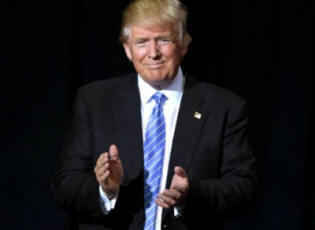
The Great Smoky Mountain Journal
Source:
Posted: Wednesday, January 17, 2018 04:21 PM
Human Rights Watch Group Says President Trump Is Protecting Human Rights Across Globe Despite Media Silence On Matter
One year ago,
Human Rights Watch listed then-presidential-candidate Donald Trump as a
threat to human rights. Now that it has been one year into Donald
Trump’s presidency, it is time to assess whether that claim held any
credence.
In the closing months of 2017, Trump withdrew funding from the United
Nations Population Fund, which engages in China’s forced-abortion
policy. The UN Population Fund maintained a partnership with China even
after reports surfaced exposing China’s government-run execution of
prisoners to harvest their organs. Why the UN continues to throw any
money China’s way in light of these appalling actions seriously
questions the UN’s official stance concerning human rights abuses. By
defunding the Population Fund, Trump demonstrated his tenacious stance
against abortion, which is one of the greatest human rights abuses of
the 21st century.
In the same vein, Trump recently sanctioned 14 Iranian entities and
individuals who have committed human rights violations. Furthermore,
Trump has publicly sided with the pro-freedom-and-human-rights Iranian
protesters and decried Iran as a state sponsor of terrorism. Protesters
willing to talk to Fox News thanked Trump for sanctioning the country
and want him to invoke harsher sanctions until Iran becomes a home for
freedom and human rights.
In addition to these two actions, Donald Trump issued an Executive Order
on December 21, 2017, declaring that “serious human rights abuse and
corruption around the world constitute an unusual and extraordinary
threat to the national security, foreign policy, and economy of the
United States, and I hereby declare a national emergency to deal with
that threat.” Additionally, the Executive Order implemented a blocking
of all persons involved in corruption and human trafficking, along with
their property and interests in property, from entering or working on US
soil. The Executive Order also included an annex of thirteen people who
have been blocked from working with and in the US on account of foreign
government corruption and/or human rights abuses.
The Trump Administration has also accepted a preponderant number of
Christian refugees by percentage than the previous administration (for
the record, Christians are one of the most persecuted religious groups
in the Middle East and Africa). In addition to accepting Christian
refugees, on October 26, 2017, Vice President Mike Pence relayed the
Administration’s threat to cut funding to the UN’s relief programs if
they continue to avoid helping persecuted Christians and minorities in
the Middle East. In response, intense negotiations commenced between the
UN and the Trump Administration which resulted in the creation of a new
relief effort that specifically aids Christians and other persecuted
minorities in Iraq’s Ninevah Province.
For a person whose campaign allegedly “floated proposals that would harm
millions of people,” Donald Trump has acted contrarily by championing
human rights causes and seeking action to curtail terrorism. These
actions are the mark of a president who cares deeply for human rights
abuse victims and seeks to advance freedom and democracy to many parts
of the world.
About the Author: John Paluska graduated from Regent University with a
B.A. in Strategic Communications and a minor in Theology. He founded the
social media news aggregation platform Soaker News in 2012 and has
previously worked for Amplify Communications to boost publicity for the
American History Film Project. John is an Orthodox Anglican and loves
reading the bible and writing about politics and culture through the
lense of Christianity

